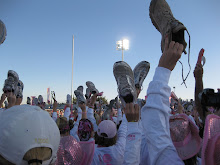Carla, Anne, Jimmy, and Charlie are all survivors of a shooting spree in a hamburger joint in their little town. Anne and Jimmy are teenagers, who were having lunch with her father when the shooter shot him. Carla is the waitress who hid in the back, near the kitchen, trying to get her cell phone to make an outbound call as she watched the shoot kill her customers. Charlie is a driving teacher who grazed by a bullet survives almost perfectly in tact. Dr. Laraby, ER doctor and son of a now deceased medical legend had just left the store on his way to the emergency room as is attending when the victims are brought in minutes later. None of them survive.
The novel unfolds in sections named by character. Each person's life just before and in the week or so after the shooting is explored intermittantly with italicized descriptions of their experience of the shooting. The reader never gets the full picture of why each person was there and what they saw until the end of the novel. That's because the novel is about what it does to them. How do these completely disparate people react in the face of this tragedy and what about their lives to then led them to those reactions?
At first all we know is Anne found God; Jimmy went mute; Charlie ran; and Carla, at first, seems to be holding it together. What slowly unfolds is far more complicated. The teenagers have a secret and Anne deals with it by preaching the good word. Jimmy, afraid to speak lest he tells, refuses to speak at all. Charlie, feeling lucky, runs to Vegas capitalize on that luck and finally make a difference for his young family. Carla slowly loses her hold on her life and her small child, and finally, Dr. Laraby risks everything trying to atone for his failures in the operating room.
The pace of the novel is great. It moves you along, if not pulling you sometimes. The exploration of the psychological toll on each of these characters is equally riveting. How does one deal with jealousy in the aftermath of tragic events? How horrible is it to realize there is some possible gain to be had from having been there? These questions are dealt with contextually - not just as the result of one event. For instance, when the unpopular girl at school is suddenly a celebratory because her father didn't survive the shooting but she did, what does that do to a teenager? How is she suppose to process that? How is her mother?
Freirich does amazing work with each of the survivors and their post trauma pathos. He wonderfully manages to not tie up every loose end, which is entirely satisfying in this case.
So, I'm shopping several months ago and stranger girl holds up shirt to show her boyfriend/husband whatever:
her: what do you think?
him: I think it looks like you read for fun.
He meant it as a bad thing. Fucker

No comments:
Post a Comment